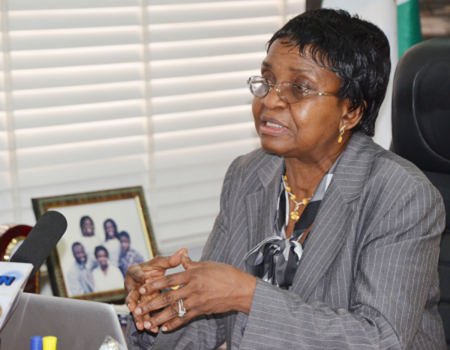The World Health Organisation (WHO) has commenced the auditing of National Agency for Food and Drug Administration and Control (NAFDAC) facilities, preparatory to the manufacturing of vaccines in Nigeria.
NAFDAC Director-General, Prof Mojisola Adeyeye disclosed this during the maiden interactive session with stakeholders held at the instance of the House Committee on Safety Standards and Regulations, chaired by Hon. Ibrahim Hamza assured on addressing various safety challenges and initiate possible areas of legislative intervention.
Hon. Hamza who underscored the need for all the regulatory agencies to step up action towards ensuring safety at the workplace in both public and private sectors, observed that the “right to safe and healthy working conditions is a basic human right as enunciated in Article 23 of the United Nations’ Universal Declaration of Human Rights, 1948 and re-affirmed by Article 7 of the United Nations’ International Convention Economic, Social and Cultural Rights, 1976.
“However, this declaration has not received the required or adequate attention it deserves as most accidents and injuries at workplaces are largely due to disregard for Safety Measures & Standards; lack of effective monitoring and compliance to Regulations and as such, this Nation has witnessed incessant avoidable accidents resulting in deaths or injuries.
“It is widely reported that there has been a worsening global statistics regarding work-related accidents, injuries and diseases, therefore the global clamour for concerted actions for the protection and promotion of the safety, health and well-being of the working population.
“Furthermore, as we are all aware, protecting the safety and well-being of the populace remains an obligatory function of Governments, hence, the need for the Nigerian Government to play a vital role in ensuring and safeguarding the safety, health and well-being of its populace both in the formal and informal sectors of the economy.”
Hon. Hamza maintained that the entrenchment of effective safety and health systems requires collective commitment and consultations between the statutory authorities, representative organizations of employers and workers, Sectional Regulators, and other relevant stakeholders, in a constructive manner that will ensure the objective of Government policies on safety are achieved.
In her remarks, Prof. Adeyeye who was represented by NAFDAC’s Director, Planning, Research & Statistics, Fori Tatama, explained that the Director-General is currently attending the high-powered meeting.
She explained that the Agency regulates issues relating to health, safety and environmental activities of 165 pharmaceutical industries, over 45,000 food manufacturing industries and over 5,000 MSMEs across the country.
In his account, Tatama said: “She (Adeyeye) is currently discussing with the WHO because the WHO is carrying out an audit of NAFDAC, which will enable the country to start manufacturing vaccines. The programme started on Monday and will last till Friday.”
On her part, Mrs Lauretta Adogu, Director, Occupational Safety & Health in Federal Ministry of Labour and Employment called for the speedy passage of the Operational Safety and Health Bill with a view to ensure proper regulation of safety in workplaces across the country.
While noting that some of the extant laws are dated back to 1956 and other subsidiary legislations, she expressed concern over overlapping functions between the Ministry and some regulatory agencies such as Nigeria Social Insurance Trust Fund and NAFDAC.
She observed that the proposed bill “seeks to make comprehensive provision for operational health and safety in work and other matters. It will also seek to establish a national council for occupational safety and health. It addresses several important issues and widens the scope of legislation as the new act will apply to all workplaces because we enforce operational safety and health in Nigeria.”
She also stressed the need for employment of additional Inspectors that will complement the efforts of the 830 factory inspectors already employed by the Ministry, as well as provision of stiffer sanctions for erring companies from N500 to N500,000 – N1 million.
However, in their intervention, the lawmakers who frowned at the underperformance of the Ministry in enforcing relevant laws, disclosed that the House through one of its Committees was able to assist NSITF to recover the sum of N5 billion from defaulters.
In his presentation, Mr Adeniyi Balogun, Head, Safety & Environment for the Department of Petroleum Resources (DPR) disclosed that most accidents in the oil industry occurred in unlicensed gas stations and filling stations.
While reiterating the resolve of the Agency towards enforcing relevant laws and regulations in the industry, Mr Balogun, said: “What we have observed is that most of those accidents happen in stations that are not licensed by DPR. That is a big challenge for us.
“When we license a company, we make sure that a rigorous process is done to make sure you are qualified to do that operation. But we are doing our best in collaborating with law enforcement agencies to make sure we dismantle any such stations not licensed. The effort is ongoing.”
Other members of the lawmakers including Hon. Solomon Maren, Hon. Amos Magaji and Hon. Ben Igbakpa who spoke during the interactive session, underscored the need to upgrade the Department of Occupational Safety to an Agency for improved productivity and service delivery.
While stressing the need for the Federal Ministry of Labour and Employment to step up its functions towards ensuring effective regulation and enforcement of relevant laws in the workplace, the lawmakers stressed the need for a review of Factory Act and other obsolete laws on safety and standards.
YOU SHOULD NOT MISS THESE HEADLINES FROM NIGERIAN TRIBUNE
Lagos Is Second Least Liveable City In The World For 2021
Lagos is the second least liveable city in the world for the year 2021. This is according to the most recent annual ranking put together by the Economist Intelligence Unit (EIU)…
CLAIM 1: A Twitter user claims UNICEF said any efforts to block children from accessing pornography might infringe their human rights.
VERDICT: MISLEADING!




